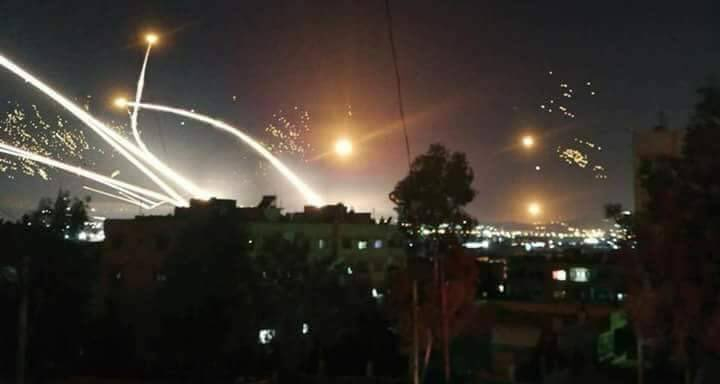
When Trump killed the nuclear deal with Iran he gave Israel the chance to start a wider war with Syria. An earlier Israeli simulation of the situation had concluded:
The crisis created by the administration regarding the flaws of the nuclear agreement could be exploited to promote issues more urgent for Israel (mainly Iran’s missile program and presence in Syria).
The Israeli government claims that Iranian support for Syria is a threat to its country. That is a bogus claim. The Israeli Prime Minister Netanyahoo uses the “Iran threat” as boogeyman to divert attention from other issues like the various corruption cases against himself.
Over the last years Israel attacked Syrian army positions more than 100 times, often in support of al-Qaedaaligned “Syrian rebels”. Syria did not respond as it was busy fighting against the Takfiri invasion within the country.
In April Israel upped the ante when it attacked the T4 base in the middle of Syria from where Russian and Iranian forces support Syria’s fight against ISIS. Iranian soldiers were killed in the attack.
The Syrian air defense shot down at least one of the attacking Israeli F-16 jets. This shooting down of the Israeli jets was thought to have established a new balance, but Israel continued to provoke.
On Tuesday, just as Trump announced his breaking of the nuclear deal, Israel launched another strike on what it claimed were Iranian missiles in Syria targeted at Israel. The strike hit a Syrian army depot. Fifteen soldiers, some of them allegedly Iranians, were killed. Even the Israeli media had trouble to find an excuse for the illegal ‘preemptive’ attack:
Even if Iran had no intention of launching missiles at Israel on Tuesday, the alleged Israeli strike came along and conveyed the following message to the Iranians: You raised the likelihood of an attack on Israel, so we’re raising the threat level, despite the tensions.
It is not Iran’s job to respond to Israeli strikes on Syria. The Syrian government wanted to retaliate immediately to Tuesday’s strike but was held back by Russian concerns. Russia saw these provocations as an Israeli trap. Yesterday Netanyahoo visited Moscow. The Russian president warned him to stop the provocations. Netanyahoo did not listen.
Last night Israel again attacked Syrian military positions in al-Quneitra in south-west Syria. This time the Syrian missile forces responded with a barrage of more than 20 missiles against Israeli positions in the occupied Golan Heights. Israel escalated further with 70 strikes against Syrian positions.
The Syrian opposition outlet SOHR confirms this chain of events:
The Israeli shelling came just before the dawn of Sunday after the fall of missiles after midnight, launched from al-Quneitra area and southwest Rif Dimashq adjacent to the occupied territories of Golan, following the Israeli shelling which took place last night and targeted locations near al-Ba’ath city in the central countryside of Quneitra.
Pictures and video from Damascus show that the Syrian air defense intercepted many of the Israeli missiles.

Israel now claims that it eliminated the “Iranian threat” in Syria:
Israel’s Defense Minister Avigdor Lieberman said that Israel’s forces struck “nearly all the Iranian infrastructure in Syria” and said that no objects were hit on the territories of Israel.
The claim of success is a signal that it does not want to go any further:
“I hope we’ve finished this episode and everyone understood,” Lieberman added, stressing that Israel doesn’t want an escalation, but “won’t let anyone attack us or build an infrastructure to attack us in the future.”
The propagandist praise of an Israeli success reminds one of previous similar claims.
On the second day of the 2006 war on Lebanon Israel loudly boosted that it had destroyed “all long-range Hizbullah missiles” in a 34 minutes long air campaign. But more than 100 missiles per day continued to hit Israel, including targets in Tel Aviv far away from the Lebanese border. Thirty one days later Israel sued for peace. Its invasion of Lebanon had been defeated. Its “successful” strike against Hizbullah’s long range missiles had hit mostly empty positions.
The Israeli targeting in Syria is not much better than its targeting in Lebanon twelve years ago.
Syria will now continue to respond to Israeli attacks. This time it limited its strikes to military positions in the occupied Golan heights. The next strikes will go further. This time Israel sent its population in the occupied Golan heights into bunkers. The next time half of Israel may have to go underground. How long could Israel sustain that?
Iran will also retaliate for attacks on its forces in Syria. But it does not need to do so from Syria. There are also other ways and means than sending missiles.
That Syria, after much suffering, now retaliated for the Israeli strikes draws a new line in the sand. If Israel wants a wider war it will get one. The destruction in the involved countries in the Middle East, including Israel, might thrown them back 100 years. Syria, Lebanon, and Iran could live with that. A 100 years ago Israel did not exist.
This article was originally published by “Moon Of Alabama”
